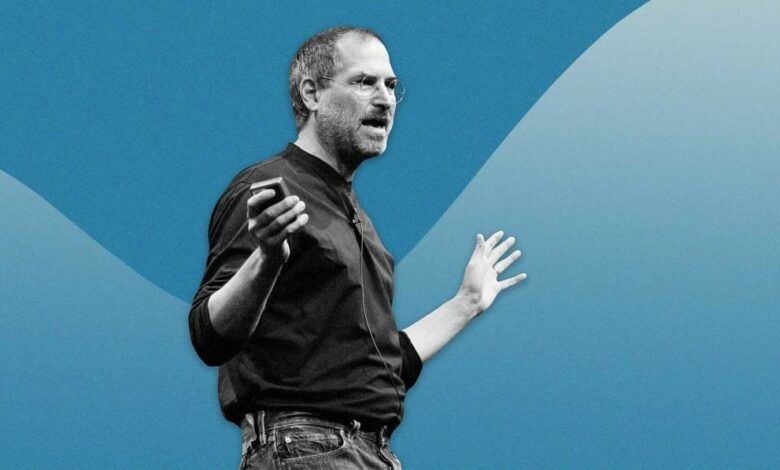Steve Jobs Said Living a Happy, Successful, and Meaningful Life Comes Down to 5 Simple Things

Twelve years later, plenty of people still look to Steve Jobs for advice. Makes sense: The Apple co-founder’s perspectives on creativity, innovation, entrepreneurship, and leadership remain just as revelatory today. (Prime example: Jobs said the best managers never wanted to be managers, and science says he was right.) Here are five of his pieces of advice that have stuck with me.
On Intelligence
Jobs spent a lot of time thinking about the nature of intelligence, if only because it’s hard to surround yourself with smart people if you can’t identify smart people what did he feel was the best indication of high intelligence? As Jobs said:
“A lot of it is memory. But a lot of it is the ability to zoom out like you’re in a city and you could look at the whole thing from the 80th floor down at the city. And while other people are trying to figure out how to get from point A to point B, reading these stupid little maps, you can just see it in front of you. You can see the whole thing. And you can make connections that seem obvious to you because you can see the whole thing.”
No matter how much information you’re able to retain, memory doesn’t necessarily help you make decisions. Jobs felt the smartest people excel at making connections. But you can’t make connections unless you collect a variety of experiences you can connect. As Jobs said:
“One of the funny things about being bright is everyone puts you on this path. To go to high school, go to college. …[But] the key thing that comes through is they had a variety of experiences which they could draw upon to try to solve a problem or attack a particular dilemma, in a unique way. What you have to do is get different experiences. To make connections which are innovative, to connect two experiences together, you have to not have the same bag of experiences as everyone else … or you’ll make the same connections.”
Try new things. Learn new things. Do things that aren’t comfortable; that’s a sure sign the experience — and what you may later draw from the experience, and be able to connect it to — is unique to you. Because it’s easy, even comforting, to learn more about something you already know. But then you’ll have the same “bag of experiences” and make the same “street-level” connections as everyone else.
On Leadership and Responsibility
No one ever does anything truly worthwhile on their own. That means we’re all, whether formally or informally, at times in a position to lead. And to take responsibility.
Many people feel success or failure is caused by external forces, especially by other people. If I succeed, other people helped me, and supported me–other people were “with” me. If I fail, other people let me down, didn’t believe in me, didn’t help me–other people were “against” me.
To some extent, that’s true. But also not totally within your control.The only thing you can control? Yourself. So act as if success or failure is totally within your control: If you succeed, you caused it. If you fail, you caused it. As Jobs would say, “Reasons stop mattering. “Never make excuses. Never list reasons. And never point fingers.
Unless, of course, you point them at yourself — and resolve that next time, you’ll do whatever it takes to make sure things turn out the way you wish.
On Perseverance
If talent is the ability to learn a subject or gain skills more quickly than most, I definitely lack talent. While Jobs was referring to startup founders, the premise is broadly applicable. For most of us, success is based on showing up, day after day, even when we don’t want to.
If you don’t have a talent for sales, sales skills can still be learned. If you don’t have a talent for leading people, most leadership skills — giving feedback, building teams, setting expectations, showing consideration for others, seeking input, focusing on meaningful priorities, etc. — can be learned. Success in most pursuits doesn’t require talent. Success simply requires the skill and experience you can gain. As long as you’re willing to keep showing up.
On Starting Your Own Business
Maybe you don’t want to start your own company, much less build a thriving business. Even so, Jobs felt everyone should dip a toe in the entrepreneurial water, even if it’s “just” a side hustle.
Start a business or a side hustle and you get to chart your own course, make your own decisions, make your own mistakes, be responsible for your own success –and learn from those decisions, mistakes, and successes. And add another dimension to your skills, your personality… and your life.
On Money
Wealth isn’t a proxy for intelligence. And definitely not for success. Easy to say when you’re worth $100 million, but still. While money does a lot of things — one of the most important is to create choices — after a certain point, research shows money doesn’t make people happier.
To Jobs, the goal was to make a living by doing what he loved. How you define a “living” is up to you, but once you’ve reached that level of financial success, make sure you also work hard to include at least a little of the “love what you do” part. Because then you’ll be living the life you want to live.
